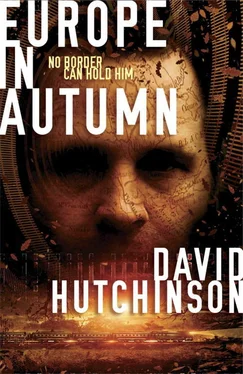“Ah,” Jan clapped him on the shoulder, “that everyone was like that.”
A pile of dessert dishes had appeared in the hatchway while they had been trying to out-macho each other. “Back to work.”
“You did come here from Poland, didn’t you?” Jan said as he watched Rudi putting the dirty dishes in a tray.
“I can’t understand this thing you’ve got about me and Poland, Jan. I’m Estonian, for heaven’s sake. I’ve never said a word about Poland, you’re the one who’s always bringing it up.”
“My cousin drives a taxi,” Jan said, leaning back against the wall. “He was down at the station when you arrived. He says you got off the express from Kraków.” He poured himself another drink. “And you do speak Polish, don’t you?”
“No.” Rudi carried the full tray over to the machine, set it on the conveyor and pressed the button to start the belt. “And even if I did, what’s so wrong with that?”
Jan suddenly became very serious. “Because I hate people lying to me, even about tiny little things.” He drank his drink. “The way I see it, if somebody’s prepared to lie to me about tiny little things they’re prepared to lie to me about great big things.”
Rudi went back to the hatch and started loading another tray. “I’m really getting tired of this, Jan. Your cousin has the wrong bloke. He saw somebody who looks like me getting off that train. Shall I tell you how I know this? I know this because I didn’t come here by train from Kraków. I hitched here from Vienna, and I hitched to Vienna from Paris.” This happened to be true; Rudi had been very careful about his approach to the Zone. “I don’t speak Polish. I’ve never been to Poland.”
Jan listened soberly to all this, nodding. When Rudi was finished, he shrugged. “You forget my position,” he said. “I take on a lot of temporary staff, sometimes people just passing through the area. Are they criminals? Are they on the run from some polity’s armed forces?” He looked at Rudi and tipped his head to one side. “Surely I should know these things.”
Rudi looked at Jan for a moment. Then he shook his head. “I’m a resident of the Zone, Jan. I’ve lived here for six years. I have a resident’s passport. I can apply for citizenship next year.”
Jan nodded. “Yes, and very good references you have from your last job. From your last three jobs, in fact. I contacted your last three employers, and they all spoke very highly of you. Which is what makes me suspicious.”
“Your logic is impeccable, Jan. My previous employers have nothing but good words to say about me. Therefore, I must be a criminal.”
“Take your girl, for example.”
“What?”
“Marta, your girl. Oh, come on. Everyone in the hotel knows about you and her.”
Well, if he’d learned anything while he’d been here it was that it was impossible to keep a secret in an hotel. “What about her?”
“Arrived here two days before you. Impeccable references. Hotel Bristol, Warsaw. The Warszawa, Warsaw. The Cracovia in Kraków. Wonderful references.” Jan almost looked nostalgic remembering them. “And here are you, just turning up at the back door with nothing but a rucksack and a nice smile.” Jan nodded and refilled his glass, apparently not caring any longer whether or not he was drunk on duty. “Terrific references.” He waved his hand, forgetting he was holding his glass, and sloshed concrete everywhere. “Just like you.”
Rudi said, “Jan,” and then he stopped.
When he thought about it later, he thought that Jan had actually heard it before it happened, which he supposed was what separated the kitchen porters of this world from the managers. They had both grown used to the increasingly raucous noise from the dining room, but Jan suddenly tipped his head to one side as if listening, and then all hell broke loose.
They went to the hatch and looked out. The dining room had been reconfigured for the disco, chairs and tables pushed against the walls. The lights had been lowered and the volume of the Poles’ sound system raised, and blinking lights and flashing lasers picked out an immense brawl. Bottles and glasses were flying across the room, people were punching each other, girls were screaming, glass and furniture was breaking. As they watched, a little circular table, caught in the stop-motion of a strobing laser, clambered jerkily out of the general chaos and hung in the air for a moment before falling back.
“I knew this would happen,” Jan said calmly, as if perversely happy to be proved right. “I kept saying this would happen.”
Rudi looked at his watch. It read 00:02. “At least they waited until midnight.”
Jan sighed. “Lock all the doors in here and close the hatch. I’ll go and call the police.” And he went out into the dining room. The last Rudi saw of him, he was wading through the melee towards the door.
Some of the waiting staff pushed into the kitchen before Rudi managed to get the door closed and bolted. They stood around in a little group listening to the sounds of things breaking and people screaming and fireworks being set off in the dining room. Then Rudi put his parka on, took his rucksack from its hiding place under one of the counters, and went out the back door to the loading bay.
It was a lovely night. The stars were bright and hard and unblinking, and down in the valley tiny little firework explosions burst over the towns. He watched them for a while, struck by how strange it was to see fireworks exploding from above. From the front of the hotel, he could hear shouting and the deep bass grumble of the engines of tracked police vehicles.
Behind him, a shoe scraped the cement beneath the loading bay’s thin layer of crusty slush.
Rudi looked round. A small, slight figure was standing a few metres away, a suitcase in one hand. The figure took another step forward into the loading bay’s lights, and Rudi saw it was a small middle-aged man, shivering in his inadequate overcoat, cheeks and nose nipped crimson by the cold. They stood and looked at each other.
“Are you the Coureur?” the little man asked finally.
Rudi sighed. Dariusz had told him it was usually pointless giving Packages word-code recognition strings. They never remembered them, he said, or forgot to use them in the excitement of the jump, or just thought they were stupid and childish, which was Rudi’s personal opinion as well.
But tradecraft was tradecraft. “I’m the kitchen porter,” Rudi said.
The little man’s face fell until something at the back of his excited, terrified mind recognised Rudi’s half of the recognition string. “Oh,” he said. “Right. Er, Are you with the Air Force?”
Embarrassing. Rudi rubbed his eyes.
“Hey!” another, cheerier voice boomed. “Hey! Are you cooking here now?”
Rudi took his hand from his eyes. Crunching through the snow towards them, looking like a blond Kodiak bear in a hugely-stuffed puffa suit, was the Hungarian who had spoken to him three years ago in Max’s restaurant, the one who had complimented him on his good fuck food.
“I’m washing dishes,” Rudi told him, trying to radiate calm on behalf of the Package.
“That’s a real shame,” the Hungarian said. “Obviously you’re wasted here.” He reached for the Package and soft-landed one huge gloved hand on the little man’s shoulder. “Stay,” he rumbled goodnaturedly.
The Package ignored the command, somehow managed to shrug his way out from under the weight of the Hungarian’s hand, and took off for the edge of the road, dropping his suitcase as he ran.
Rudi and the Hungarian looked at each other. Rudi wasn’t carrying a weapon, and wouldn’t have used one if he was. The Hungarian smiled at him.
The Package reached the edge of the service road and jumped, disappearing down the slope in a flurry of snow and flying coat-tails. There was a shout, a thump, then silence.
Читать дальше







